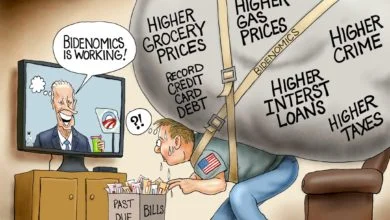Crowded Early Presidential Field is Healthy for Democracy
Though the 2016 election is approximately 16 months away, the list of declared presidential candidates is already lengthy.
On the right, George Pataki, Ted Cruz, Rick Santorum, Rand Paul, Lindsay Graham, Marco Rubio, Ben Carson, Carly Fiorina, Mike Huckabee and Rick Perry have announced their candidacy. The left’s field is smaller, limited so far to Hillary Clinton, Martin O’Malley, Linc Chafee and Bernie Sanders, but may soon grow, as prominent national figures on both sides of the political aisle have announced they will soon announce their candidacy.
With the 2012 Republican primary carousel still prominent in the mind of many voters, the herd of declared and exploratory candidates is already wearying. To many, it promises intense intra-party bickering, the inundation of the airwaves with attack ads and wasted money on campaigning.
All of these things are frequently characterized as yet another example of a broken system.
But, this view is narrow and shallow; it does not take into account the complexity of national politics.
Impassioned pundits will often wax poetic about federalism and the devolution of power. But, the emphasis on localism that is such an important part of the American political lexicon is never translated into the language of the electoral system.
Diversity in small communities demands power be kept at a level where people’s stake in the outcome makes it more likely they act and debate prudently. This is exactly how the primary system works.
A political party is a community which people join of their own volition and act in to an extent they deem appropriate for their interests.
However, this does not guarantee unity of interests. Though there are overarching principles that bind party members in office and the electorate together, that does not mean they think alike in regards to particulars. So long as these differences are real and legitimate, there is a need for debate, not only so that the merit of ideas becomes evident through contrast, but in order to find which approach is most prominent since action has to be consensus drive to some degree.
The American political system is unique in that parties are bifurcated primarily not on values or ideas, but their belief in the strength of government. Yes, values are a hugely important part of a given party’s constitution, but they are more informed by what societal entity should take responsibility for a given need.
When this is the chief dichotomy and there are only two major parties, a host of beliefs that are similar at a macro level and different at a micro level must necessarily arise. And this is a wonderful thing because it forces debate over real and substantive matters. Ultimately, this cannot but help to strengthen personal ideologies and the political class, in turn making government more sound and more efficient.
In practice, this is obviously a flawed system. Sophistic rhetoric and venial platitudes often come to the forefront in debate, but this does not change the basic fact that substantive discussion is necessary. It is the responsibility of voters to weed out the serious, meritorious politicians from the bloviating, self-seeking hacks.
Long exposure to the public is the dominant tool through which this is accomplished. The primary system with its debates and campaign speeches exists to serve this function. And rather than looking upon this as some necessary evil where the failings of democracy are flouted, voters should see this as a system that empowers their voices.




